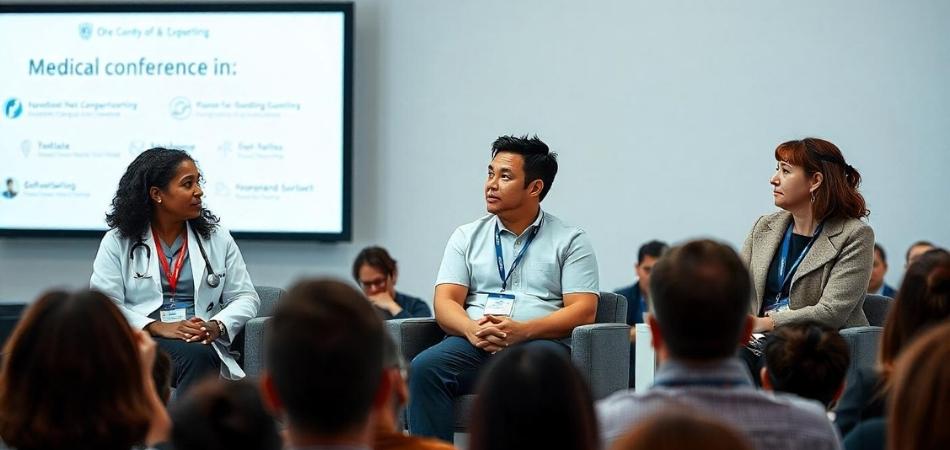The importance of providing feedback after attending a medical conference cannot be overstated for both participants and organizers. By collecting feedback, organizers can better adapt future conferences to meet attendees’ needs and continuously improve them. But the question is, how do I provide feedback after attending a medical conference?
The best way to provide feedback after attending a medical conference is to complete the official survey or email the organizers directly. Your feedback should highlight the aspects of the conference you found valuable and suggest improvements.
Remember to be specific, constructive, and polite in your comments to help shape more impactful future events. For a more detailed analysis of effective feedback strategies, continue reading our article and learn how to craft meaningful feedback.
Why Providing Feedback After a Medical Conference Matters?
Providing feedback after a medical conference is essential for continuous improvement. Organizers rely on your insights to improve future events’ quality and relevance. Your insightful criticisms and praises allow the conference to better serve its attendees.
When you share your experience of attending an international medical conference, it significantly contributes to the growth of the community. Each piece of feedback is an opportunity to voice what works and what could be improved. This process ensures that future gatherings reflect the needs and expectations of those who participate.
Engaging in this feedback loop also benefits you as a participant. It encourages community and collaboration among professionals. Moreover, it allows organizers to address your specific concerns, making each conference more beneficial for everyone involved.
How Do I Provide Feedback After Attending a Medical Conference?
After a medical conference, participants and organizers need to give each other feedback. Especially in Canada, providing feedback opens the door to networking and opportunities. It guarantees that future events can be better adapted to meet attendees’ needs. Here’s a detailed explanation of how to provide feedback after attending a medical conference:
Step 1: Complete the Official Survey
Most conferences provide a survey post-event. Take the time to fill this out thoughtfully, as your responses directly influence future planning. Include all aspects of the conference experience in your answers, such as the quality of speakers and the effectiveness of the schedule layout.
Step 2: Write a Constructive Email
If you have additional thoughts, consider sending a detailed email to the organizers. Describe both the positives and the areas for improvement of the conference. Make sure your feedback is clear and objective so that it can be understood and acted upon easily. Mention specific sessions or elements that were particularly impactful, or those that need reevaluation.
Step 3: Discuss with Peers
Engage in discussions with fellow attendees about their experiences. This can provide new perspectives and reinforce your feedback. Sharing insights with peers can also help you gauge the general sentiment about the conference. This might uncover common areas that need attention, which can be highlighted in your formal feedback.
Step 4: Follow Up
When you provide detailed feedback, following up shows your commitment to making improvements. It also keeps the conversation going and may prompt quicker responses and actions from the organizers. A polite follow-up email or call can ensure your suggestions are not overlooked and considered for future planning.
Step 5: Public Review
Writing a public review on professional networks or the conference website can also be beneficial. It helps potential participants make informed decisions and also acknowledges the organizers’ efforts publicly.
Step 6: Suggest Specific Improvements
Be proactive by suggesting specific improvements. Understanding the benefits of attending medical conferences can help you provide detailed recommendations that enhance educational and networking opportunities. This ensures that the event remains a valuable resource for all participants.
For instance, Canada is renowned as a global platform for international conferences, particularly in the medical field. By providing constructive feedback at these medical conferences in Canada 2024 , you can help shape future events to offer even greater opportunities for networking and career advancement.
Factors to Keep in Mind While Providing Feedback After Attending a Medical Conference
The feedback from medical conferences helps shape future events to improve customer service. It bridges the gap between participants’ expectations and organizers’ offerings. However, we need to consider some factors when providing feedback. Here is a detailed explanation.
- Clarity and Focus: Clearly express your thoughts to ensure they are easily understood. Focus on specific aspects for actionable insights. This clarity helps organizers grasp your feedback and implement necessary changes effectively.
- Constructiveness: Aim to be constructive, highlighting both strengths and areas for improvement. This helps create a positive environment for change. Constructive feedback encourages organizers to build on their successes while addressing weaknesses.
- Timeliness: Provide feedback promptly after the conference. Timely input is more relevant and actionable. Quick responses allow for immediate reflection and adjustments for future events.
- Specificity: Reference specific sessions or features when discussing aspects that worked well or didn’t. This adds value to your feedback. Specific examples help the organizers understand the context and make informed decisions.
- Balance: Aim for a balanced review that acknowledges both positives and negatives. Balanced feedback is often more credible and useful. Highlighting strengths can motivate organizers while addressing weaknesses can guide improvements.
- Follow-up: Consider following up if necessary, especially if you have made significant suggestions. This shows your commitment to improving future events. A follow-up can also encourage ongoing dialogue and collaboration with the organizers.
Ensure these reminders before providing feedback on attending the conference. Be careful of the differences between conference feedback and conference report writing. identify the factors to refine your feedback. Do not mix up the steps to writing a medical conference report with the steps to writing conference feedback.
Does Timely Feedback Make an Impact on Medical Conference Success?
Yes, timely feedback plays an important role in medical conferences’ success. It allows well-known conference organizers to make quick adaptations and improvements based on what worked and what didn’t. By addressing concerns quickly, conferences can maintain high standards and meet participants’ expectations effectively. Here’s how timely feedback makes a difference:
Enhanced Planning for Future Events
An immediate feedback system helps organizers identify successful elements. This allows them to replicate these aspects in the future. Conversely, pointing out flaws quickly prevents future occurrences. This cycle of improvement keeps the conference relevant and effective.
Increased Attendee Satisfaction
When feedback is given promptly, issues are resolved faster. This responsiveness can increase participant satisfaction, as they feel their concerns are valued and addressed. A satisfied attendee is more likely to recommend the conference to a peer and return to it in the future. As a result, attendees become loyal to the event.
Optimized Resource Allocation
Timely feedback allows for the more efficient use of resources. Having an idea of the resources that were insufficient or excessive helps in better planning. This optimization reduces waste and increases the overall efficiency of the event. As a result, organizers will be able to allocate resources more effectively in the future.
Stronger Engagement with Participants
A sense of community and involvement is developed when participants are given immediate feedback opportunities. This shows that the organizers care about the participants’ experience. This engagement strengthens the conference’s interactive nature. An event with a greater level of engagement is typically more dynamic and successful.
Better Educational Outcomes
Timely feedback can directly impact conference educational goals. This allows organizers to adjust their content to meet the needs and preferences of attendees. When educational sessions are adjusted based on feedback, the outcomes of learning are improved. This makes the conference more valuable to its attendees.
Can I Provide My Medical Conference Feedback on Social Media?
Sharing feedback about your medical conference experience on social media is a great way to connect with fellow professionals and enhance community engagement. Here are some points to consider.
Select the Right Platform
Choose a social media platform that is well-suited for professional dialogue, like LinkedIn or Twitter. These platforms are popular for sharing industry insights and connecting with other attendees. Engaging on the right platform ensures your feedback reaches those who can benefit from it.
Maintain a Professional Tone
While sharing your thoughts, it’s essential to keep a respectful and professional tone. Constructive criticism is helpful, but negative comments can harm relationships and reputations. Always remember that your posts reflect on you and the medical community as a whole.
Use Relevant Hashtags
Incorporate relevant hashtags to enhance the visibility of your posts. Using hashtags related to the conference can help others find your feedback more easily. Additionally, you can share medical conference experience on social media to invite further discussion and connect with others who attended.
Engage with Responses
Encourage dialogue by responding to comments on your posts. This interaction can develop a sense of community and promote shared learning experiences. Engaging with others helps you build professional relationships and gain new insights from fellow attendees.
Tips for Writing Constructive Feedback for a Medical Conference
The value of constructive feedback can be applied to both personal development and professional events such as conferences. The process helps identify strengths and potential growth areas. Here are a few tips for writing feedback that is both helpful and encouraging:
- Be Specific: Identify precise elements when giving feedback. Clear and detailed points help the recipient understand exactly what needs attention and can lead to meaningful changes.
- Stay Positive: Start with a positive perspective before suggesting improvements. This approach makes the recipient more open to hearing your suggestions and creates a more constructive conversation.
- Use “I” Statements: Frame your feedback from your perspective to reduce defensiveness. This personal touch encourages the recipient to reflect on their actions and promotes a more collaborative environment.
- Offer Solutions: Don’t just highlight problems; suggest practical solutions or alternatives. Providing actionable recommendations shows that you care about the recipient’s growth and are invested in their success.
- Keep It Relevant: Focus your feedback on relevant issues to maintain its effectiveness. Staying on topic ensures your points resonate and are taken seriously, promoting better understanding.
- Be Objective: Try to remove personal bias from your feedback and focus on objective criteria. This lends credibility to your comments and encourages the recipient to view them constructively.
- Encourage Dialogue: Invite responses to your feedback to support better interaction. Engaging in conversation creates an opportunity for deeper perspective and further insights, enhancing the feedback experience.
Frequently Asked Questions
Providing feedback after attending a medical conference is important for both attendees and organizers. Your insights can help improve future events and enhance the experience for everyone involved. Here are some common questions and answers to guide you in giving effective feedback.
Is It Better to Provide Feedback Anonymously or With My Name?
It depends on your comfort level. If you prefer to be honest without hesitation, anonymity may encourage more candid responses. However, providing your name allows organizers to follow up for clarification and acknowledge your input. Consider the impact you want your feedback to have when making your choice.
What Should I Do if I Couldn’t Attend All Sessions or Events?
Focus your feedback on the sessions you did attend and share your experience regarding those. If specific scheduling conflicts affected your attendance, mention them. This information can help organizers improve future scheduling and accommodate attendees better. Your input is valuable, even if it’s limited to certain sessions.
How Detailed Should My Feedback Be?
Be as detailed as possible when providing feedback, especially if you’re suggesting improvements. Specific examples help organizers understand your perspective and make actionable changes. Vague feedback may be difficult to interpret, so clarity is essential. Your insights can significantly impact the quality of future conferences.
Can I Provide Feedback if I Attended Virtually?
Absolutely! Feedback from virtual attendees is vital for assessing the effectiveness of online sessions. You can share your experiences regarding technical aspects like platform usability and the overall virtual experience. This feedback helps organizers improve their online offerings and ensure a better experience for future participants.
Should I Include Feedback on Logistics Like Venue and Catering?
Yes, logistics play a significant role in the overall experience of a conference. Mention any logistical issues that impacted your enjoyment or participation, such as accessibility concerns or food preferences. Your feedback can help organizers create a more accommodating environment for all attendees. Sharing your thoughts on these aspects can lead to improvements in future events.
Bottom Line
The best way to improve medical conferences is to give feedback after you’ve attended. When you participate in the feedback process, you’re directly contributing to the development of future events. This is particularly significant as each piece of feedback helps refine the conference scope, content, and logistics.
When thinking about “How do I provide feedback after attending a medical conference?”, take note that your feedback contributes to a continuous improvement loop, so organizers can design events that are more engaging, educational, and inclusive.
Whether you provide feedback via surveys, emails, or direct conversations, your constructive comments will be invaluable in ensuring the success of upcoming medical conferences.








